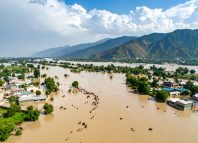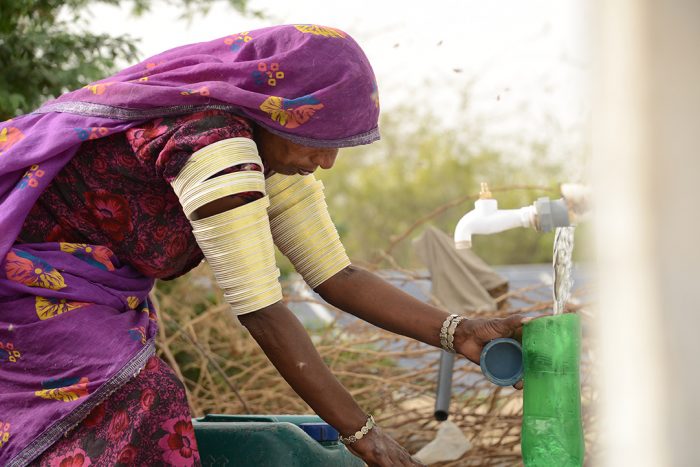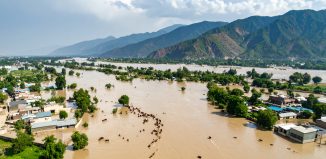Improving community well-being, nutrition and living standards through enhancing disaster resilience against droughts in Sindh, Pakistan
Sodho is the President of the Village Management Committee and Disaster Risk Reduction (DRR) Committee of Male Jo Par Village in Umerkot, Pakistan. He has actively been working to promote sustainable farming practices and build community awareness on DRR to enhance community resilience on recurrent hazards and climate change impacts. The Village Management and the DRR Committees[1] were established in September 2020 under Community World Service Asia’s emergency response project[2], supported by the Ministry of Foreign Affairs, Japan.
“I have coordinated and helped the project team conduct 19 trainings focused on kitchen gardening, fuel efficient stoves, sustainable agricultural practices and DRR since last year. It is a relief to see that our people have the knowledge and skills to protect themselves from natural hazards.”
On September 24th, 2020, an orientation for VMC members was organised to share project objectives and to familiarise members with the role of the committee and as individual members.
“All 15 members, seven women and eight men, were explained their responsibilities as VMC members. We were taught on how and when to coordinate with the project team and how we can contribute in organising project activities. By the end of the training I was also elected as the President of the committee.”
Sodho, along with fifteen other community members, participated in a training on DRR held in October 2020. All training participants shared and learned about common natural and man-made hazards such as earthquakes, floods and fire, experienced in the region.
“The knowledge on DRR was new to the community members. They now know of and are well aware of the different disasters that their people are faced with and have identified ways of alleviating and lessening its effects. Through the training, communities were provided technical knowledge on all kinds of hazards, developing disaster prevention plans and the importance and methods of raising community awareness on DRR.”
Sodho shared a recent accident where a fire broke out at a house in a nearby village. The family was saved but they suffered a massive loss as all their essential belongings and household items were burnt.
“As an active member of the VMC, I immediately called for a meeting to discuss how we can collect donations and help the family recover from the loss. We were able to collect some clothes, food items and essential household items for the family. Through the immediate help, the family found some relief and were hopeful to recover from the monetary and infrastructural loss sooner.”
“VMC members also organised a lesson learning session for their local communities on what they had learned at the DRR training to further enhance community knowledge and capacity on preparedness and mitigation. To overcome natural and man-made disasters, the participants were told about the different disasters and how to minimize the destruction they bring to affected areas. We also shared the story of the house-fire as an example and conducted drills to show what items to save first in the case of a fire and how to prevent the damage caused by such disasters.”
Kitchen gardening, primarily engaging women in the target villages, is another key component of the project. Sodho was personally quite interested in this initiative as having an opportunity to grow healthy vegetables at home seemed like a blessing and was a new concept introduced in the village.
“I saw the benefits of kitchen gardening immediately when the team shared the concept. Growing healthy vegetables at home can bring good health to families and save money as well which was otherwise mostly consumed on purchasing vegetables from the market.”
“I encouraged all women in the village including my own wife to participate in the kitchen gardening trainings. In the last winter season, my wife grew white radish, carrots, spinach, lady fingers and pumpkin in her new kitchen garden. I could see how much she enjoyed working and bringing seeds of different vegetables and fruits from the market to grow in her garden. She is now growing watermelon, guar[3], pumpkins, bottle gourd and lady fingers.”
Sodho further added that their village, Male Jo Par, has existed for the past hundred years and in these many years no-one had ever thought of starting kitchen gardening.
“We reside in the remote areas of Umerkot. The agriculture fields are faced by severe water scarcity. The land has low productivity due to unfertile soil and lack of water. We never thought of growing vegetables in our homes so conveniently with the help of home-made fertilisers and compost. Today, families in Male Jo Par grow garden-fresh vegetables on a daily basis, improving the quality and quantity of their food consumption, nutrition and well-being.”
Sodho also participated in a training session focused on sustainable agricultural practices for farmers, conducted in December 2020 under the project. Ten other small-scale farmers took part in this training.
“Before we took the training, all of us farmers stocked all seeds together in plastic containers and could not differentiate good ones from the bad ones. We would plough the land and sow all the seeds. Consequently, not all crops would grow well. The money that we spent ploughing and harvesting the land would be wasted as the produce would not be as fruitful as expected. This year was different. We stocked the seeds in Stoneware Pots (Matka) and before sowing them, we dried the seeds for at least three days under the sun. As a result, we had a good harvest this year.”
Our village has seen a positive change since the initiation of the DRR project. There has always been severe water scarcity in our area. The RO plant[4], which is being constructed in our village, will also help our people and those of surrounding villages to a great extent. It will provide clean drinking water at a walking distance. Our wives and daughters will not have to travel far places to collect water.”
[1] These are community based structures, members consisting of community people, who are responsible to coordinate project activities and awareness building. They are the key for sustainability and viability of project activities and mobilization of available local resource.
[2] Enhancing disaster resilience against droughts in Sindh Province
[3] Guar is an important legume crop. It is cultivated for fodder as well as for grain purpose.
[4] A reverse osmosis plant is a manufacturing plant where the process of reverse osmosis takes place. Reverse osmosis is a common process to purify or desalinate contaminated water by forcing water through a membrane.







